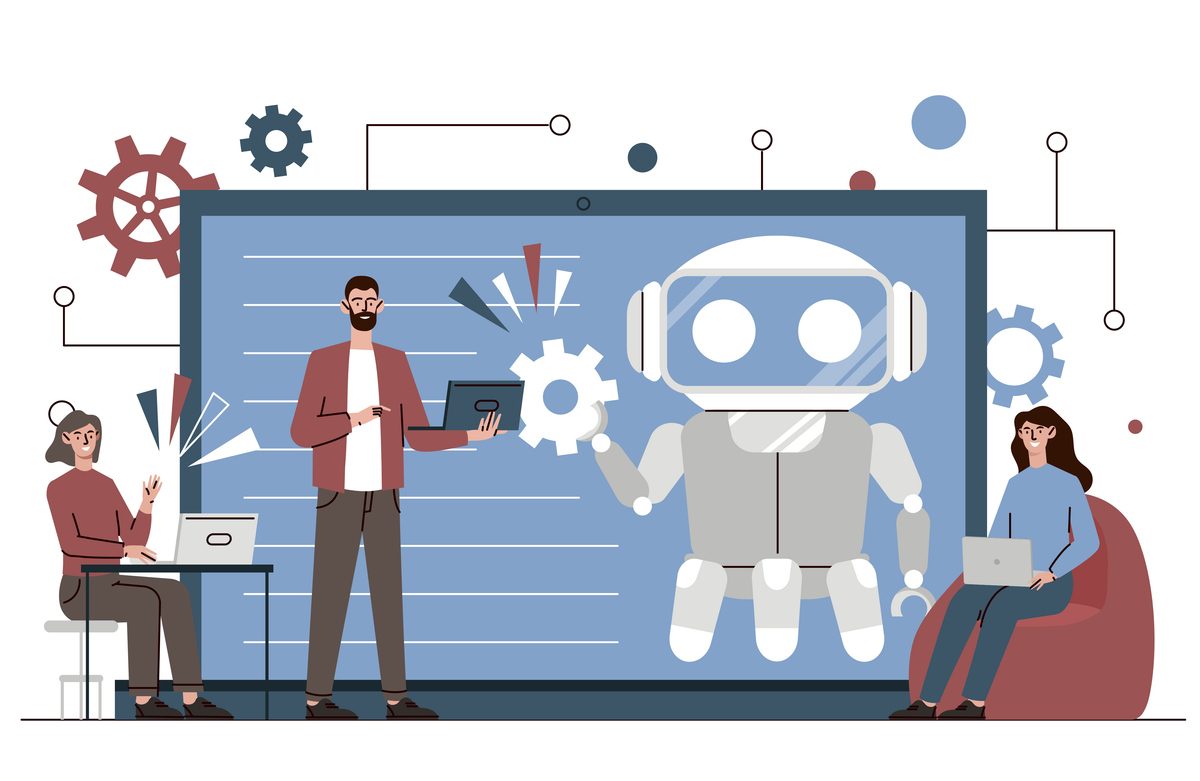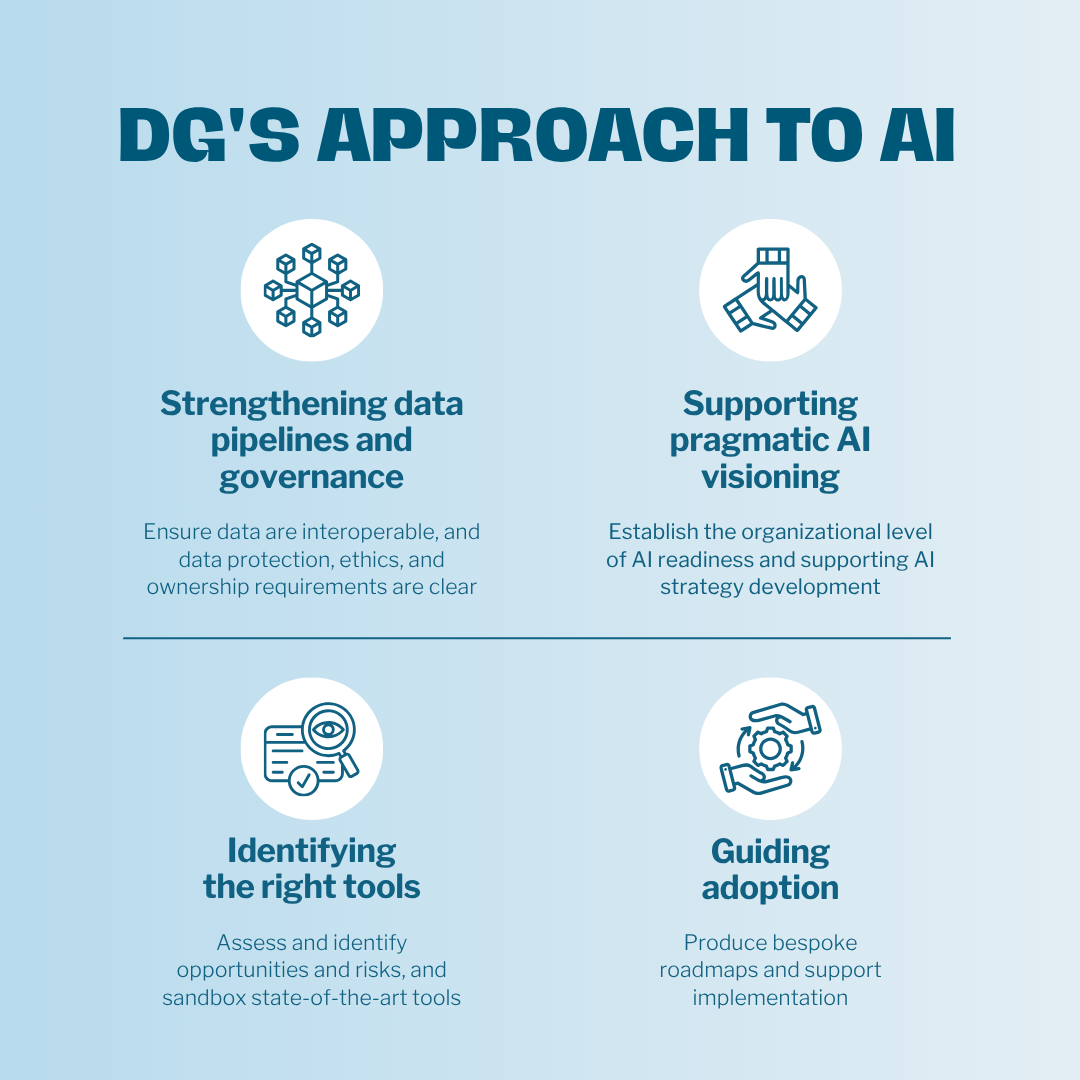
Accelerating Institutions: How DG’s 25 Years Create Unique Value for AI
As we celebrate 25 years of DG’s efforts supporting institutions to use digital and data to accelerate and amplify their impact, governments, companies, organizations, and people globally are grappling with how to invest in AI tools with this same goal in mind. Technology is evolving rapidly, the hype cycle is overwhelming, and many implementations are falling short of their intended value.
Often, as any good technologist will likely tell you, the technology is the easy part, and failure lies in a combination of design, process, capacity, and commitment. The next few years will require thoughtful and adaptive efforts to rightsize and rework AI implementations that create real value and impact in the lives of students, smallholder farmers, patients, and others who rely on them.
At DG, our engagement with AI follows the same use case-driven, complexity-respecting capabilities and methods that we have used for decades:
- We look beyond hype to identify and drive genuine value. Our processes begin with understanding people’s missions, capacity, and objectives, distilled into use cases and problem definitions that ensure that institutional solutions are both grounded in context and truly impactful for our partners.
- We have a deep understanding of working with governments and their existing technology ecosystem. Effective AI solutions rely upon high-quality, accessible, and well-governed data. We have decades of experience supporting staff across levels in government ministries – and other large institutions – in assessing, updating, and making interoperable their existing ecosystem of legacy data systems. The correct combination of technical, political, analytical, and change management skills needed for this work is invaluable (and rare) in positioning Low- and Middle-Income Countries (LMIC) public sector institutions to meaningfully adopt and use AI to become more effective.
- We are impartial and outcome-oriented. DG is a technology-agnostic organization. When appropriate, we prioritize using open-source tools that prevent vendor lock-in and preserve flexibility. We open-source our own technology and have registered multiple Digital Public Goods. Governments, organizations, and other institutions may have existing agreements with technology vendors, and we are comfortable evaluating and working with proprietary software. This flexibility allows us to effectively act as a trusted advisor for leaders choosing among a rapidly changing array of possible AI applications, rather than a vendor for any single product.
- We balance ethics, sustainability, and pragmatism. Our partners operate in complex environments with complex challenges. We do not believe that technology can solve every problem, and it must be paired with the right intentions and processes. Flexibility, compromise, and attention to long-term sustainability are key to successful digital transformation and resilience.
With these principles in mind, DG is engaging in AI through four pillars:

- Strengthening data pipelines and governance
For decades, DG has delivered systems interoperability and strengthened data pipelines, helping institutions maximize their data systems. Our Aid Management Program (AMP), for example, launched twenty years ago with the belief that standardized aid data could strengthen country ownership of the development process and align aid with national priorities.
We’ve also shared insights from transforming Ethiopia’s livestock data systems into a resilient, interoperable data ecosystem and have informed best practices in data governance across health, agriculture, and other sectors from the farm level to cross-border contexts.
Grounded in this expertise, we will continue to enable the flow of interoperable data, establish governance protocols, unlock inter-institutional data sharing, promote privacy, and center ethical considerations that bolster successful AI readiness and responsible adoption.
- Supporting Pragmatic AI Visioning
DG applies our technology-agnostic approach to define use case-driven requirements for AI and assess potential solutions. Through a co-design process, we work with stakeholders to identify use cases and existing workflows before developing technical requirements and solutions.
This same approach guides our assessment of organizational AI readiness and informs our development of AI strategies and roadmaps. Our visioning takes factors such as existing digital infrastructure, technology policies, and personnel capacity into consideration, balancing ambition and pragmatism. This approach allows for AI strategies that are context-driven and fit for the future. Through the Early Grades Education Activity [Asas for short], led by IREX in Jordan, we are supporting the development of a new AI strategy for the Ministry of Education.
- Identifying and Sandboxing the Right Tools
Landscaping – DG’s experienced software development team and history of translating global best practices into local solutions position us well to support the execution of AI visions. Once use cases for AI are established and prioritized, in turn creating a decision framework, we can systematically scan the fast-changing landscape of AI projects, software tools, and services that could potentially meet stakeholder and institutional needs.
Our evaluation framework considers not only the technical capability, interoperability, and scalability, but also sustainability factors such as licensing models, energy efficiency, portability, and policy alignment (i.e., data sovereignty regulations in country). We also assess local and regional AI efforts. This landscaping clarifies which tools merit deeper exploration for next steps and highlights the risks and limitations of potential solutions.
Sandboxing – When appropriate, DG can develop a controlled environment, known as an AI Sandbox, for safe experimentation and red teaming. Open-source solutions can be directly deployed in our sandbox, while proprietary tools will be evaluated via structured demos and reviews with prospective vendors. We capture metrics–such as potential efficiency gains, accuracy and reliability, governance alignment, user experience, and total cost of ownership–that will inform if and how specific tools can be taken further. This hands-on exploration enables stakeholders to see how tools perform against real requirements and builds a tangible foundation for decision-making for leaders in the changing AI space.
- Guiding Adoption and Scale
Institutions worldwide are grappling with how AI pilots will scale. Whether we are analyzing the results of the landscaping and sandboxing or partnering with a government that has already deployed solutions, we guide further adoption and scale.
This pillar of engagement includes both technical development, accompaniment of enterprise adoption, and recalibrating AI roadmaps into actionable plans for scale, incorporating recommendations on what should be adopted, adapted, and avoided. Recommendations can also incorporate standards for software, hardware, data standards, ethical safeguards, sustainable development, and capacity-building programs, all of which improve the chances of long-term sustainability of systems.
Technology Changes, Institutional Use Stays (Largely) the Same
Remarkably, while AI is potentially revolutionary and transformational, our methods for engaging with it remain within DG’s standard principles and approaches. Our partnership with IREX embodies this ethos, combining DG’s data systems and governance expertise with IREX’s institutional performance leadership to help civil society and government partners responsibly unlock AI’s potential. The technology may be new, yet ensuring we are context-driven, ethically grounded, and sustainability-focused has been DG’s ethos for decades.
Excitingly, we are already engaging with AI through our partnership with IREX and in other work across sectors and borders. Looking forward, these areas of focus will guide our support to partners across our priority sectors: education, agriculture, health, and governance.